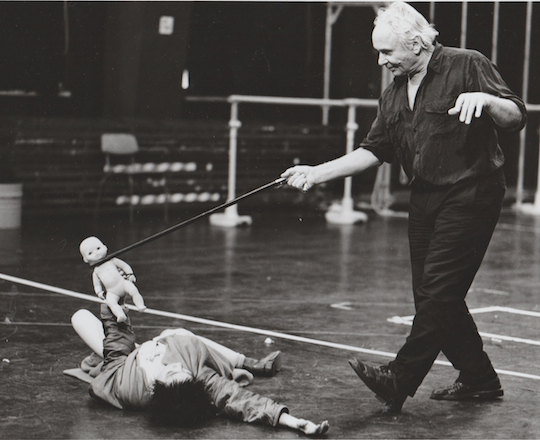The start and significance of political dance theatre in Germany is linked with one name above all: Johann Kresnik.
Himself a solo dancer at the Cologne opera house, Kresnik turned away from classical ballet, which he no longer found topical, at the end of the 1960s. He began creating his own choreographies that looked at contemporary political events. His 1968 work Paradies? (Paradise?) was a radical break with the conventions and aesthetic of classical dance: in what amounted to shocking images for the audience of the day, Kresnik made the attack on Rudi Dutschke a subject of discussion and sparked a theatrical scandal: the birth of political dance theatre.
Shortly afterwards, Kresnik was appointed by the artistic director of Bremen Theatre, Kurt Hübner, to redevelop the theatre’s dance department. It was here that his Kriegsanleitung für jedermann (The People’s Guide to War) emerged in 1970. This choreography served as the starting point for the former Kresnik dancer and choreographer Yoshiko Waki’s TANZFONDS ERBE project.
Rather than focusing on Kresnik’s artistic work and his importance for dance history alone, the project was also looking at the issue of the extent to which the inventor of choreographic theatre also influenced and changed the structure of the German dance scene.
Two conferences in Berlin and Münster that built on each other investigated the importance of Kresnik’s works, particularly his early pieces, under the title Ausweitung der Tanzzone (Expansion of the Dance Zone).
The dance theatre piece Friedensanleitung für jedermann (The People’s Guide to Peace), which relates loosely to Kresnik’s choreography Kriegsanleitung für jedermann, premiered at the Pumpenhaus in Münster.
In April and May 2018, the company hosted a residency programme as part of its project in Münster. The programme continued the "Expansion of the Dance Zone" symposium and translated it into practice. The residency artists were:
Neta Weiner, Stav Marin, Julia Dick, René Haustein and Lukas Zerbst.
Artistic direction – Yoshiko Waki, Rolf Baumgart
Creation, dance – Charlotte Goesaert, Elina Pohjonen, Johanna-Yasirra Kluhs, Krzystof Raczkowski, Loukiani Papadaki, Martijn Joling, Tim Gerhards, Ziv Frenkel, Damian Pielka, Petra Korink, Thomas Achtner, Jennifer Peterson
Production – bodytalk
Co-production – Theater im Pumpenhaus
Fundes by – Ministerium für Familie, Kinder, Jugend, Kultur und Sport des Landes NRW, Tanzfonds Erbe – Eine Initiative der Kulturstiftung des Bundes, Kunststiftung NRW, Kulturamt Stadt Münster
Supported by – Deutsches Tanzfilminstitut Bremen
Conferences
Friedensanleitung für jedermann – dance theatre by bodytalk
- 5 May 2017 | Theater im Pumpenhaus Münster – premiere
- 6 May 2017 | Theater im Pumpenhaus Münster
- 19 – 21 May 2017 | Dock 11 Berlin
Film screening
- 7 and 14 May 2017 | Theater im Pumpenhaus Münster: Ulrike Meinhof. Choreographic theatre by Johann Kresnik
Works by the residency artists
- 29.04.2018 | Welttanztag Münster
- 02.05.2018 | Theater im Pumpenhaus Münster
- 11.05.2018 | Kunsthaus Rhenania, Köln








